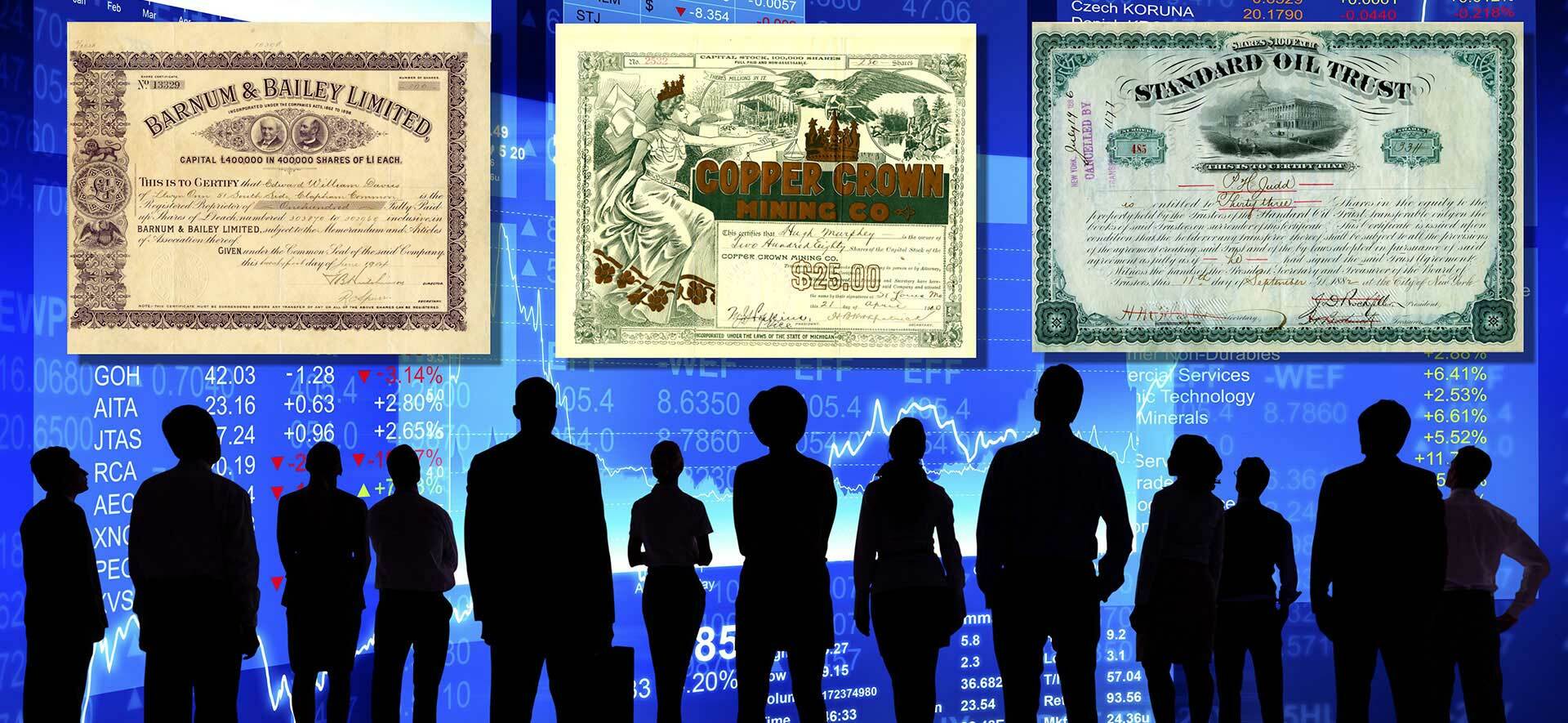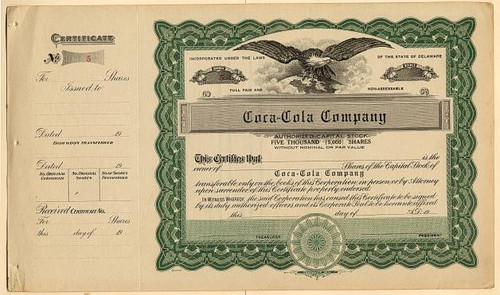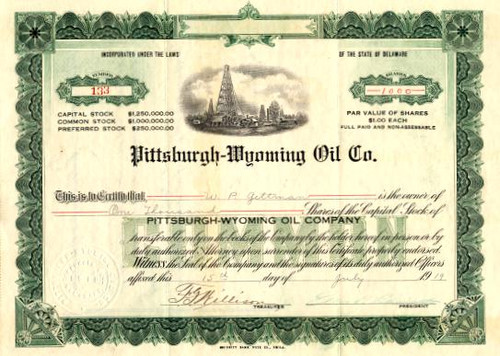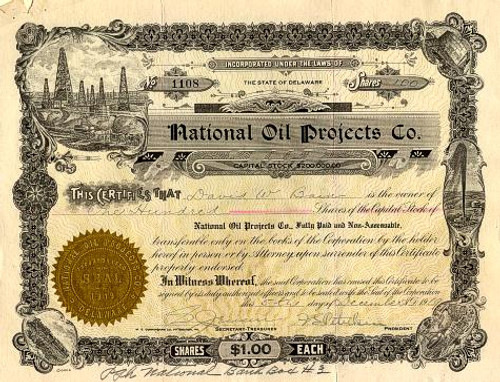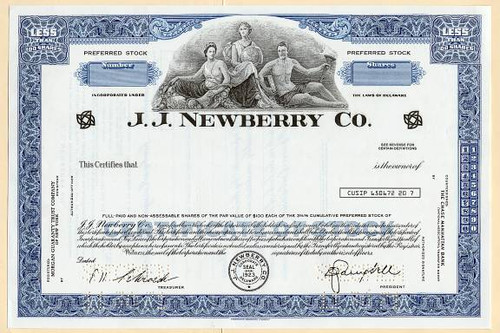Beautiful engraved RARE specimen certificate from the Royal Crown Cola Company printed in 1978. This historic document was printed by Federated Bank Note Company and has an ornate border around it with a vignette of an allegorical woman. This item has the printed signatures of the Company's President, Donald A. McMahon and Secretary, W. Morgan. This is a transition certificate with a red overprint "Name Changed to Royal Crown Companies." 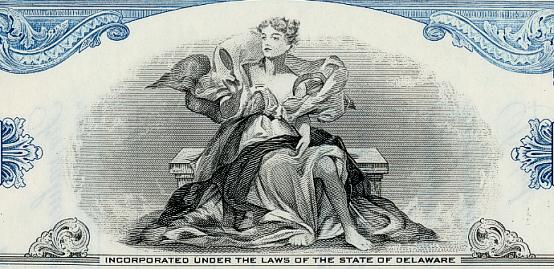
Certificate Vignette R.C. Cola (or Royal Crown Cola) is a cola soft drink developed in 1905 by Columbus, Georgia pharmacist Claude A. Hatcher. RC Cola contains (in order from most to least) carbonated water, high fructose corn syrup and/or sugar, caramel color, phosphoric acid, caffeine, natural flavors, gum acacia (gum arabic), and citric acid. The first product in the Royal Crown line was "Chero-Cola" in 1905, followed by Royal Crown Ginger Ale, Royal Crown Strawberry and Royal Crown Root Beer. The company was renamed Chero-Cola, and in 1925 called Nehi Corporation after its colored and flavored drinks. In 1934, Chero-Cola was reformulated and re-released as Royal Crown Cola. In the 1950s, the combination of R.C. Cola and Moonpies became popular in the American South. In 1958, the company introduced the first diet cola, Diet Rite, and later the first caffeine free cola, "RC 100". In the mid-1990s, the company released Royal Crown Draft Cola, billed as a "premium" cola and using pure sugarcane. Offered only in 12-ounce bottles, the cola's sales were disappointing and it was quickly discontinued with the exceptions of Australia and New Zealand. Philippe Bailly successfully introduced "Royal Crown Draft Cola" to the French marketplace in 1999. The company has also released Cherry R.C. a cherry flavored version of the R.C. soft drink to compete with Coca-Cola Cherry and Wild Cherry Pepsi. In the early seventies, the Royal Crown Cola Company made a serious commitment to its overseas development and at that time, a number of experienced soft drink people were assembled to manage and direct the Company's international efforts. Since then RC Cola has been able to establish a viable base in the world market, and as of 1996 is sold in 62 countries through a network of 105 franchise bottling plants and distributors. The international growth of RC is due, in part, to the fact that the world cola market is immense. Cola is by far the most popular flavour in the US, with over 60% of the market and most countries around the world it is fast approaching a similar share. RC Cola has been able to reach a strong competitive position in the world market because of its ability to innovate and to adapt to various market needs. To develop its international potential, Royal Crown Cola Co. International divided the overseas market into five major sales areas: Europe, Middle East/Africa, Far East, Latin America, CIS/Baltics, and organized appropriate field staff and concentrate manufacture to service these areas. RC Cola has been very selective in its international growth, emphasizing quality rather than quantity as it relates to the bottler organization. Prior to 1970, most international RC plants were modest "outpost" operations. It has since been determined that to get a share of the hard-fought cola category, it takes a substantial, well managed bottler operation that can give RC Cola dedicated support. For a cola brand to be viable, it also takes an all-out marketing effort on a continuing basis. In 1975, Donald A. McMahon assumed the presidency of Royal Crown Cola Co. and Edward F. O'Reilly became president of the newly created soft drink division. Under O'Reilly's leadership growth began once again to exceed that of the total industry. That was the year the advertising slogan "Me and My RC" swept the country. It was also the year that the company's corporate headquarters moved from Columbus Georgia to Atlanta, leaving the soft drink division only in the Columbus office. Arby's, (phonetic spelling of the initials R.B., for "R"affei "b"rothers) a fast food chain specializing in roast beef sandwiches, was added to the Royal Crown Cola Co's list of acquisitions in 1976. In 1978, the corporate name was changed to Royal Crown Companies, Inc. to reflect the diversification. The soft drink division remained Royal Crown Cola Co. Also in 1978, Fred M. Adamany, a successful bottler from Rockford, Ill. was named president of the soft drink division. Division headquarters were moved to Rolling Meadows, Ill., a suburb of Chicago. Included in the move were the president's office, sales and marketing. Financial, production, syrup and international departments remained in Columbus, Georgia office. In October 2000, Royal Crown was acquired by Cadbury Schweppes plc through its acquisition of Snapple. Royal Crown operations were folded into Dr Pepper/Seven Up, Inc., a former subsidiary of Cadbury Schweppes. In 2001, all international RC-branded business was sold to Cott Beverages of Mississauga, Ontario and is operated as Royal Crown Cola International. Operations in the United States, Canada, Mexico, Puerto Rico, and other U.S. territories are now handled by Cadbury Schweppes Americas Beverages. History from Wikipedia and OldCompanyResearch.com.
About Specimens Specimen Certificates are actual certificates that have never been issued. They were usually kept by the printers in their permanent archives as their only example of a particular certificate. Sometimes you will see a hand stamp on the certificate that says "Do not remove from file". Specimens were also used to show prospective clients different types of certificate designs that were available. Specimen certificates are usually much scarcer than issued certificates. In fact, many times they are the only way to get a certificate for a particular company because the issued certificates were redeemed and destroyed. In a few instances, Specimen certificates we made for a company but were never used because a different design was chosen by the company. These certificates are normally stamped "Specimen" or they have small holes spelling the word specimen. Most of the time they don't have a serial number, or they have a serial number of 00000. This is an exciting sector of the hobby that grown in popularity over the past several years.

Certificate Vignette
About Specimens Specimen Certificates are actual certificates that have never been issued. They were usually kept by the printers in their permanent archives as their only example of a particular certificate. Sometimes you will see a hand stamp on the certificate that says "Do not remove from file". Specimens were also used to show prospective clients different types of certificate designs that were available. Specimen certificates are usually much scarcer than issued certificates. In fact, many times they are the only way to get a certificate for a particular company because the issued certificates were redeemed and destroyed. In a few instances, Specimen certificates we made for a company but were never used because a different design was chosen by the company. These certificates are normally stamped "Specimen" or they have small holes spelling the word specimen. Most of the time they don't have a serial number, or they have a serial number of 00000. This is an exciting sector of the hobby that grown in popularity over the past several years.



